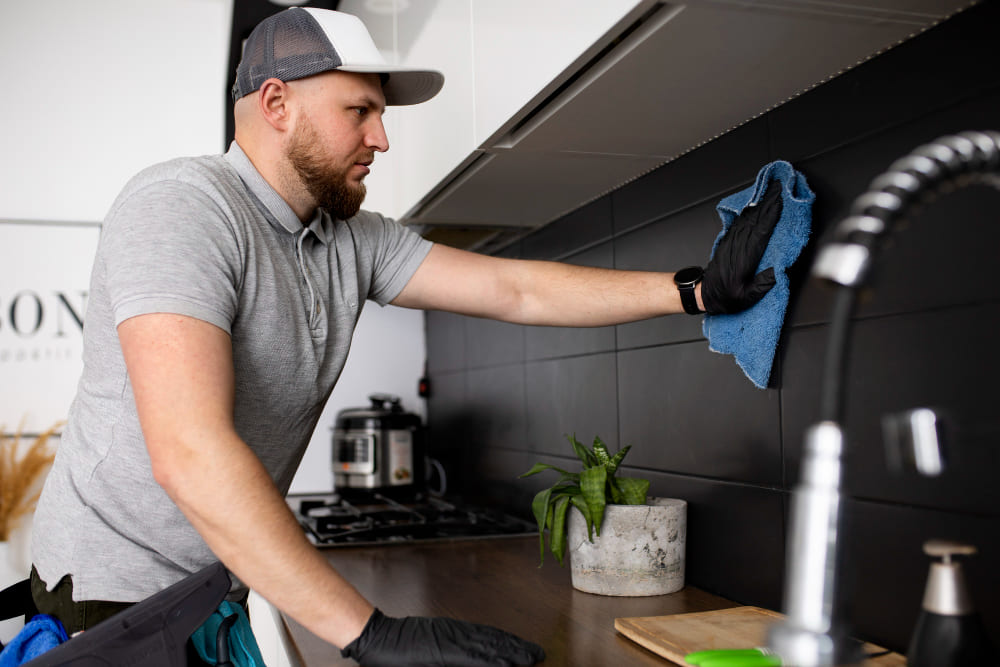
for and Maintain
Your Newly Installed
Stone Countertops
Proper care and maintenance are essential to preserve the beauty and longevity of your stone surfaces. Follow our expert tips and guidelines to keep your countertops, backsplashes, and other stone installations looking their best.
- Regular Cleaning: Use a soft cloth or sponge and a mild detergent to clean your stone surfaces. Avoid using abrasive cleaners or harsh chemicals that can damage the stone.
- Spill Management: Wipe up spills immediately to prevent stains, especially for acidic substances like lemon juice, vinegar, or wine.
- Use Coasters and Trivets: Place coasters under glasses and trivets under hot pots and pans to protect the surface from heat and moisture damage.
- Avoid Heavy Impact: Do not drop heavy objects on stone surfaces as it can cause chips or cracks.
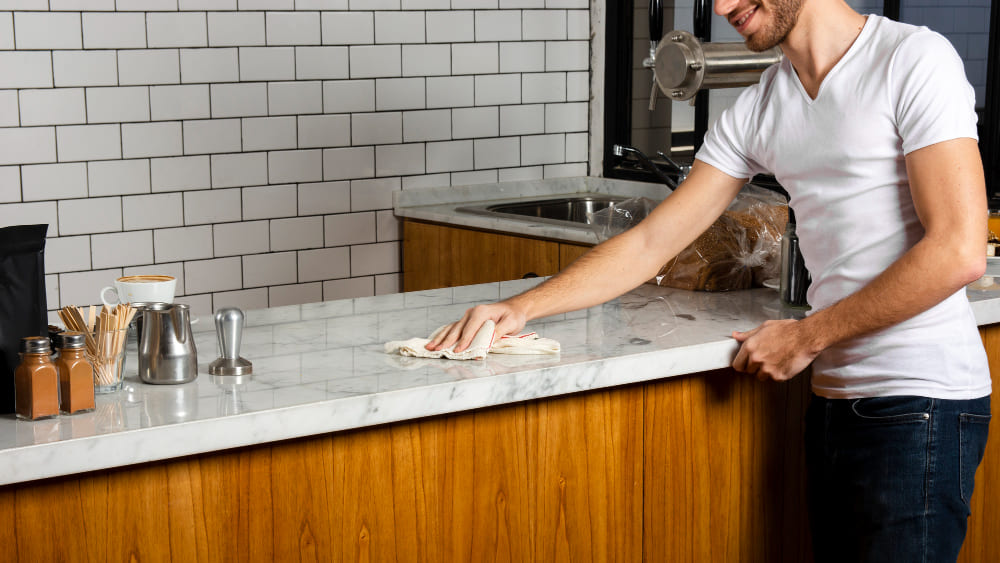
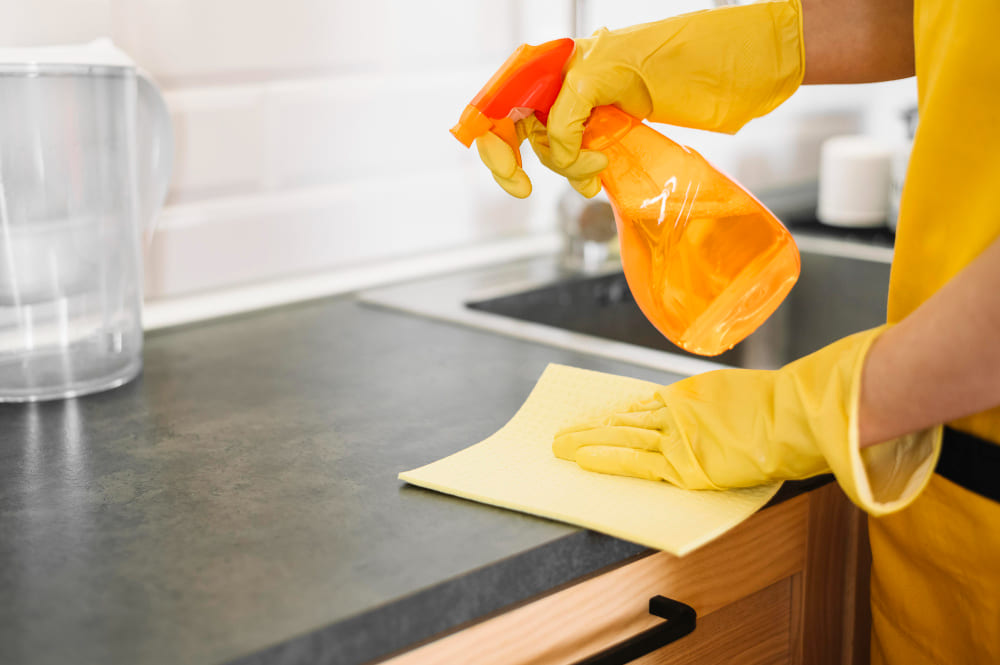
- Granite:
- Seal your granite countertops every 1-2 years to maintain their resistance to stains.
- Use pH-balanced cleaners specifically designed for granite.
- Avoid sitting or standing on granite countertops to prevent cracking.
- Marble:
- Use a marble-specific cleaner to maintain its shine and prevent etching.
- Re-seal marble surfaces every 6 months to a year.
- Be cautious with acidic substances, which can easily etch marble.
- Quartz:
- Quartz is non-porous and does not require sealing.
- Clean with mild soap and water, avoiding harsh chemicals and abrasive pads.
- Protect quartz from prolonged exposure to direct sunlight to prevent discoloration.
- Soapstone:
- Oil soapstone periodically with mineral oil to enhance its color and maintain its appearance.
- Soapstone is non-porous and resistant to stains, but it’s softer than other stones, so avoid cutting directly on it.
- Slate:
- Clean slate with a damp cloth and mild detergent.
- Slate can be sealed to enhance its color and protect against stains.
- Avoid using acidic or abrasive cleaners on slate surfaces.
- Onyx:
- Onyx is more delicate and requires gentle cleaning with a soft cloth and pH-neutral cleaner.
- Seal onyx surfaces every 6 months to a year.
- Avoid placing hot items directly on onyx to prevent thermal shock.
- Quartzite:
- Quartzite requires sealing every 1-2 years to maintain its durability.
- Use non-abrasive cleaners and soft cloths for daily cleaning.
- Avoid acidic cleaners to prevent etching.
- Oil-Based Stains: Use a poultice made of baking soda and water or a commercial stone poultice to draw out the stain.
- Organic Stains: Clean with a mixture of hydrogen peroxide and a few drops of ammonia.
- Rust Stains: Use a poultice or a commercial rust remover specifically designed for stone.
- Water Stains: Buff with a dry, soft cloth or use a stone polishing powder.
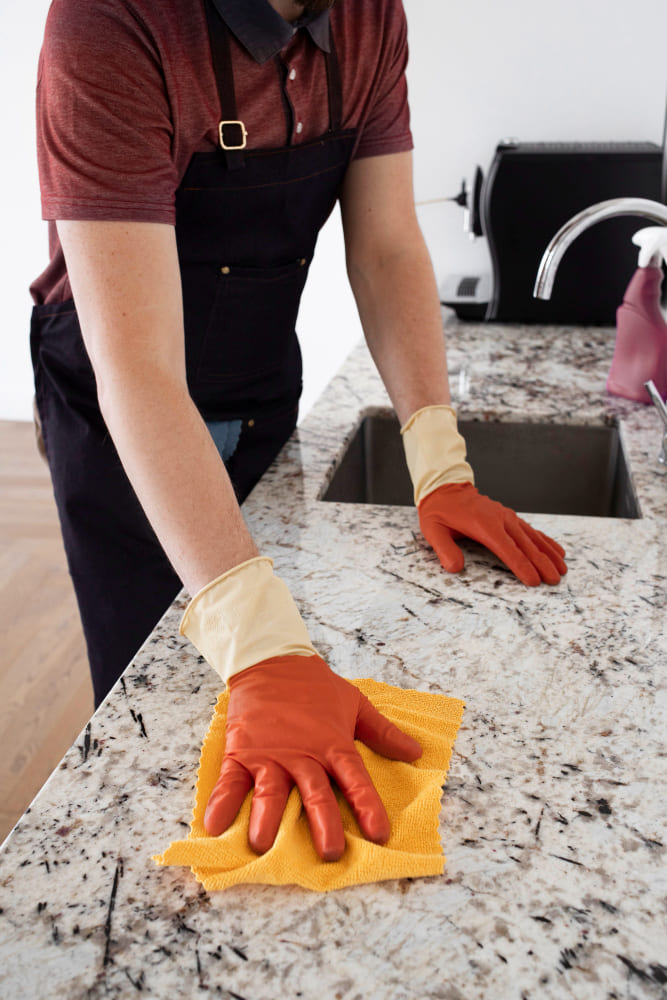
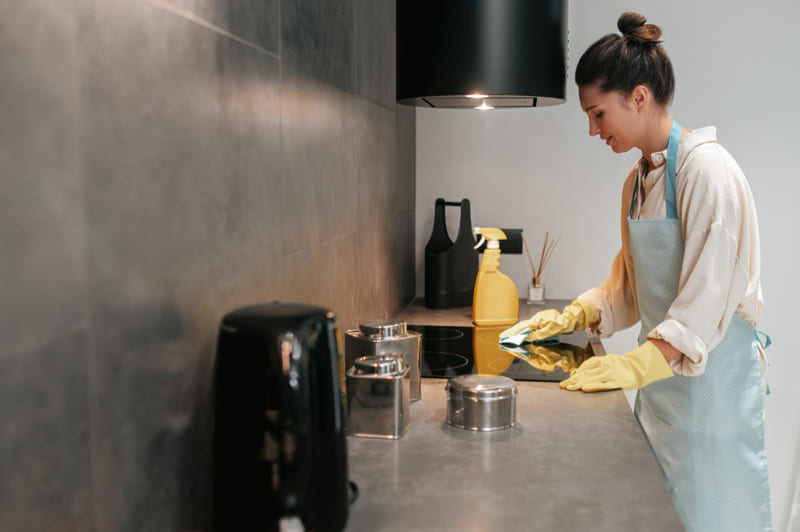
- Why Seal? Sealing creates a protective barrier that helps prevent stains and damage from moisture.
- When to Seal: Seal your stone surfaces periodically based on the type of stone and usage. Typically, every 6 months to 2 years.
- How to Seal:
- Clean the surface thoroughly before sealing.
- Apply a high-quality stone sealer using a soft cloth or sponge.
- Allow the sealer to penetrate the stone for the recommended time, then wipe off any excess.
- Buff the surface to a shine with a clean, dry cloth.
We speak English, Spanish, and Portuguese.
Don’t be discouraged if your city is not on this list, we are very accommodating, please call no matter what!
FAQ
Frequently
asked
questions
We recommend setting up an appointment with one of our sales team. We recommend you bring a floor plan, sample of cabinet and colors to help you assist with picking the perfect stone for your project.
It is easier than ever to update the look of your kitchen. With our digital template plotter, we can get accurate measurements without removing the old countertops. You will have a running kitchen till the day of the new countertops are installed. You will only need the assistance of a plumber and electrician to help us disconnect the old plumbing and electrical and reconnecting.
Stone Concepts offers the latest technology in stone sealers. Today we can apply a 15-year sealer to your natural stone warrantied by Dry Treat. Note that the sealer will not protect marble against etching.
Marble is one of the oldest options for countertops. If you are lucky enough to travel through old Europe you will find it being used everywhere. At Stone Concepts we like to educate you on the products you will choose. The issue with marble is that it will patina. Some customers love the patina look and others don’t. For customers who don’t like the patina looked of marble there is also products on the market such as Tuffskin that will help you protect the marble so it is etch free. We always provide our clients with samples so they can test the product and understand if it is the correct choice for their lifestyle.
Honestly, we can not say for sure which product will be best for you and your family. That is why we take the time to educate our customers on the pros and cons of each stone. They are all solid choices and aesthetically different from one to the other.
Here is a brief summary on each one:
QUARTZ:
For the most part Quartz is a fool proof product that will not stain. It has a factory warranty. It is not completely heat proof as the advertising claims. It can crack with thermal shock. We always recommend using a trivet or heat pad. Quartz can also chip, but chips are repairable.
QUARTZITE:
Quartzite is a hard, non-foliated metamorphic rock which was originally pure quartz sandstone. Sandstone is converted into quartzite through heating and pressure usually related to tectonic compression within orogenic belts. Quartzite has the look of a marble but it will not react to acidic food like a typical marble would. We recommend using a 15 year sealer. Beware of suppliers that label their stones as quartzite. You should always test the sample for hardness and sensitivity to acid.
